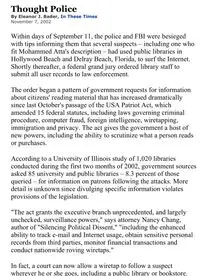
thought police PDF
Preview thought police
Thought Police By Eleanor J. Bader, In These Times November 7, 2002 Within days of September 11, the police and FBI were besieged with tips informing them that several suspects – including one who fit Mohammed Atta's description – had used public libraries in Hollywood Beach and Delray Beach, Florida, to surf the Internet. Shortly thereafter, a federal grand jury ordered library staff to submit all user records to law enforcement. The order began a pattern of government requests for information about citizens' reading material that has increased dramatically since last October's passage of the USA Patriot Act, which amended 15 federal statutes, including laws governing criminal procedure, computer fraud, foreign intelligence, wiretapping, immigration and privacy. The act gives the government a host of new powers, including the ability to scrutinize what a person reads or purchases. According to a University of Illinois study of 1,020 libraries conducted during the first two months of 2002, government sources asked 85 university and public libraries – 8.3 percent of those queried – for information on patrons following the attacks. More detail is unknown since divulging specific information violates provisions of the legislation. "The act grants the executive branch unprecedented, and largely unchecked, surveillance powers," says attorney Nancy Chang, author of "Silencing Political Dissent," "including the enhanced ability to track e-mail and Internet usage, obtain sensitive personal records from third parties, monitor financial transactions and conduct nationwide roving wiretaps." In fact, a court can now allow a wiretap to follow a suspect wherever he or she goes, including a public library or bookstore. That's right: Booksellers can also be targeted. What's more, the government is no longer required to demonstrate "probable cause" when requesting records. "FBI and police used to have to show probable cause that a person had committed a crime when requesting materials," says Chris Finan, president of the American Booksellers Foundation for Free Expression (ABFFE). "Now, under Section 215 of the Patriot Act," Finan continues, "it is possible for them to investigate a person who is not suspected of criminal activity, but who may have some connection to a person [who is]. Worse ... there is a gag provision barring bookstores or libraries from telling anyone – including the suspect – about the investigation. Violators of the gag order can go to jail." Members of Congress, as well as librarians, booksellers and ordinary citizens, have expressed outrage and concern over the Orwellian reach of the law. On June 12, the House Judiciary Committee sent a 12-page letter to the Justice Department requesting hard data on the number of subpoenas issued to booksellers and libraries since last October. Two months later, on August 19, Assistant Attorney General Daniel J. Bryant responded. The figures are "confidential," he wrote, and will only be shared with the House Intelligence Committee. The Judiciary Committee told Bryant the response was unsatisfactory. Finan reports that everyone is "waiting to see what the committee will do next." Meanwhile, the ABFFE has joined a coalition of booksellers and libraries to denounce Section 215. They have also signed onto a Freedom of Information Act request for information on both the number and content of subpoenas issued. To date, there has been no response to their entreaty; though such responses are required by law, they can often take months or even years to complete. But community activists, librarians and publishers have joined forces to publicize the threat that the act poses to free speech, privacy and civil liberties. The American Library Association, a national alliance of library staff, issued a statement in early 2002 affirming their position: "Librarians do not police what library users read or access in the library. Libraries ensure the freedom to read, to view, to speak, and to participate." Though the ALA has agreed to cooperate with federal requests within the framework of state law, it has warned local branches not to create or retain unnecessary records, and trained staff to read subpoenas carefully before providing unnecessary information. Despite this modicum of defiance, everyone agrees that Section 215 has begun to exact a toll. "Right after 9/11, Americans seemed eager to learn more about the world," says Larry Siems, director of International Programs at the PEN American Center. "They were reading, buying and checking out books on Islam. ... But the administration's overall approach discourages people from seeking information. It is counterproductive. We end up with a society that is more isolated, less able to respond to the rest of the world." In addition, he states, the Constitution guarantees that Americans have the right to read books, write books, and express their opinions. Even when the ideas expressed are unpopular – even when they're downright unpatriotic or seditious – the government should not be in the business of prohibiting them. Indeed, he cautions, the distinction between acts and ideas is imperative. Finan and Chang agree, and they are doing their best to ensure that the Patriot Act fades away in October 2005, when it is set to expire. "At the very least," Finan concludes, "we want changes in sections like 215, to exempt libraries and bookstores from scrutiny."
